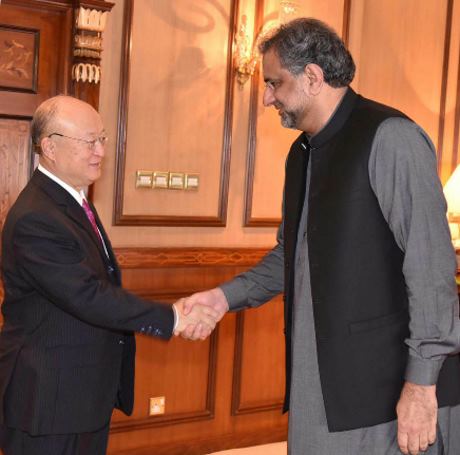Amano commends Pakistan nuclear safety and security
Pakistan is ready to strengthen its relationship with the International Atomic Energy Agency (IAEA), the country's prime minister, Shahid Khaqan Abbasi, told IAEA Director General Yukiya Amano this week. Amano commended Pakistan's efforts to increase nuclear safety and security.
 |
| Prime Minister Abbasi, on the right, receives Yukiya Amano on 12 March (Image: PMO) |
According to the Prime Minister's Office (PMO), Abbasi and Amano discussed various issues related to cooperation between Pakistan and IAEA were discussed, with Abbasi noting the "positive role" played by the IAEA in the promotion of peaceful uses of nuclear technology in Pakistan.
"The Prime Minister observed that Pakistan, which has decades of experience in the use of nuclear technology for peaceful purposes, was ready to further strengthen its partnership with the Agency and contribute to the achievement of Sustainable Development Goals worldwide. With extensive experience and expertise in the nuclear field, Pakistan is well placed as a provider of services in various IAEA programmes and activities," the PMO said.
Abbasi briefed Amano about Pakistan's energy development plans and the significance of nuclear power generation in the energy mix as a clean and environment friendly source of energy.
According to the IAEA, Amano "expressed his appreciation" for Pakistan's cooperation with the agency and its active contribution to IAEA efforts to build capacity in other countries in the region by providing experts and hosting training courses.
Amano met with Abbasi on 12 March during a three-day visit to the country, which included a trip to the site of the Karachi nuclear power plant, also known as KANUPP. The IAEA director general observed construction work on two Hualong One units, which are being built by China National Nuclear Corporation, and the physical protection measures that had been implemented. Karachi units 2 and 3 are the first export of the pressurised water reactor design and are scheduled for completion in 2021 and 2022, respectively. They will operate under international safeguards under a 2017 agreement between the IAEA and Pakistan.
Amano was also briefed by the chairman of the Pakistan Atomic Energy Commission (PAEC), Muhammad Naeem, on the commission's role in overseeing the increasing use of peaceful nuclear technology to meet the country's development goals. He was also informed by PAEC and the Pakistan Nuclear Regulatory Authority about the steps Pakistan is taking to further strengthen nuclear safety, with the two bodies working in tandem to establish a robust safety culture at nuclear facilities.
The IAEA has this year launched a four-year project to help bring together key institutions in Pakistan to work more closely on the safe, reliable and sustainable operation of nuclear power plants, the agency noted.
Pakistan's five operating nuclear power plants - a small pressurised heavy water reactor at Karachi, and four Chinese-designed pressurised water reactors at Chashma - provide a total of 1355 MWe of generating capacity. Completion of Karachi 2 and 3 will add a further 2322 MWe. A third 1161 MWe Hualong One unit is planned for construction at Chashma.
Researched and writtenby World Nuclear News